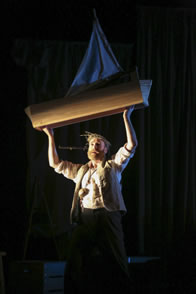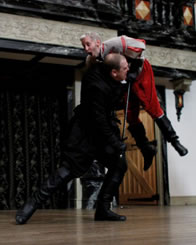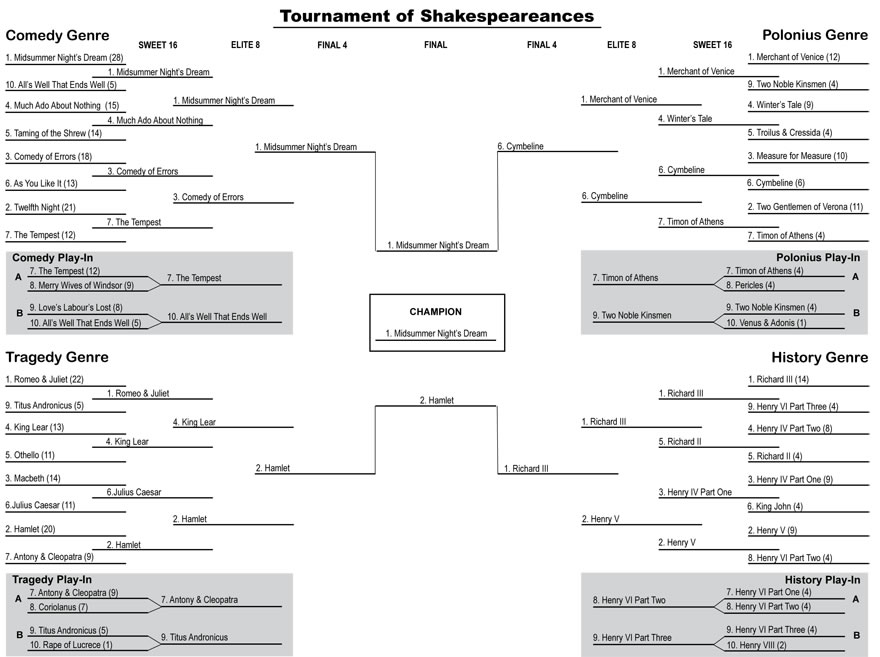A Tournament of Shakespeareances
The Play-In Matches
For a tournament overview, click here
You get an idea of William Shakespeare's abilities writing timeless comedy when, in this tournament in which seedings are based on the number of stage productions I've seen, The Tempest (12 productions) and The Merry Wives of Windsor (9) are seeded seven and eight in the 10-play Comedy Genre. But that matchup is not nearly as intriguing in this tournament as the Antony and Cleopatra vs. Coriolanus contest in the Tragedy Genre and two parts of the Henry VI trilogy going head-to-head. Meantime, the Polonius Genre (Tragical-Comical-Historical-Pastoral) features the only blowout in this first round of the tournament. And true to the spirit of March Madness, we have some controversy over seedings.
Comedy Genre
 James Lavender as Prospero in the Aquila Theatre's production of The Tempest. Photo by Richard Termine, Aquila Theatre.
James Lavender as Prospero in the Aquila Theatre's production of The Tempest. Photo by Richard Termine, Aquila Theatre.7. The Tempest (12) vs. 8. The Merry Wives of Windsor (9)—On paper, this would seem a no-brainer, as many critics consider The Tempest to be one of Shakespeare's classics (and is one of my favorites) while Merry Wives is generally panned as one of his lesser efforts. But plays are played on stage, not on paper. Whereas I've seen some memorable Falstaffs (at the American Shakespeare Center in 2009 and 2013) and Fords (Royal Shakespeare Company in 1979 and ASC 2009), for the longest time the only Tempest that stood out in my memory was the End Games Festival installment at The National Theater in 1988. However, a recent run of productions—text-centric versions at ASC in 2011 and this year at Taffety Punk, this year's intriguing thematic turn of the play by the touring Aquila Theatre, and Synetic's 2013 “Silent Shakespeare” version performed in a pool of water—give The Tempest the ultimate edge and sends it on to a matchup with number two seed Twelfth Night.
9. Love's Labour's Lost (8) vs. 10. All's Well That Ends Well (5)—It's hard to beat the 1960s-set, Beatlesque production of Love's Labour's Lost that Michael Kahn staged for the Shakespeare Theatre Company in 2006, bolstered by the staged-in-one-day Bootleg Shakespeare production by Taffety Punk in 2013. And let's face it, while Love's Labour's Lost contains some obtuse humor, All's Well is built around one of Shakespeare's flimsiest plots. Yet, the latter play has a number of brilliantly drawn characters, and when brilliantly played, as in Shakespeare's Globe's 2013 film version and ASC in 2013, one of Shakespeare's most charming works emerges. All's Well ends best in this contest, sending it next against the tournament's top-seed juggernaut, A Midsummer Night's Dream.
Tragedy Genre
7. Antony and Cleopatra (9) vs. 8. Coriolanus (7)—This matchup of Shakespeare's two late Roman plays features the tandem of Ralph Fiennes's riveting 2011 film version of Coriolanus and a moving Oregon Shakespeare Festival production in 2008 against Stratford Festival's sexy Cleopatra last year and Chesapeake Shakespeare Company's epic 2013 production in the ruins. But the big man—and woman—dominating play in this contest is Antony Hopkins and Judi Dench in the landmark 1987 Peter Hall production at the National Theater, sending Antony and Cleopatra on to a match with number two seed Hamlet. The great Dane could be in trouble.
9. Titus Andronicus (5) vs. 10. The Rape of Lucrece (1)—Though the latter is a narrative poem, this match is closer than you might suspect. The one performance of Lucrece I've seen is a hard rock, spoken-verse and dance production at Taffety Punk in 2012. But Titus just has too much going for it on stage, from Dead Playwrights Repertory's 2013 staging inviting us to eat cookies from Titus's pot of pie to Faction of Fools' commedia delle'art version last year, not to mention ASC's truly touching 2009 production. Titus moves on to a date with top seed Romeo and Juliet.
History Genre

Benjamin Curns as Richard, Duke of Gloucester, kills Somerset, played by Bob Jones, in Henry VI, Part Two at the American Shakespeare Center's Blackfriars Playhouse. Photos by Tommy Thompson, American Shakespeare Center.
7. Henry VI, Part One (4) vs. 8. Henry VI, Part Two (4)—These two run-and-gun early works by Shakespeare could compete with almost any other play in the tournament, let alone in the History bracket. Against each other, it's a high-scoring race, with Part One's Joan of Arc scenes, squabbling English lords, silly French lords, and Suffolk's wooing of Margaret in both the ASC 2009 and Hamlet Isn't Dead 2014 productions matching point for point Part Two's Cade's Rebellion, arrogant Suffolk's murder at the hand of pirates, Margaret carrying Suffolk's head, and Beaufort's death at ASC in 2010. The winning score comes at the buzzer: In ASC's production of Part Two, Benjamin Curns playing the young Richard, Duke of Gloucester, runs his sword through Bob Jones' Somerset and twirls him through the air to his death. Second seed Henry V awaits this middle installment of his son's story.
9. Henry VI, Part Three (4) vs. 10. Henry VIII (2)—The Tudor monarch makes a game effort with just two productions, 2010 at the Folger Theatre and 2013 at ASC. But this Shakespeare–John Fletcher collaboration can't keep up with Shakespeare's earliest masterpiece, the third part of his Henry VI trilogy. It features Margaret at her fiercest, Richard evolving into the psychopath he would become in his eponymous sequel to this play, Edward at his most lascivious, Clarence at his most duplicitous, and Henry at his most introspective, plus such memorable scenes as Margaret's torture of York and Henry's mole hill soliloquy. Whether it's the ASC 2011 production or Hamlet Isn't Dead version last year, Henry VI, Part Three, presents as one of Shakespeare's best pieces of stagework. But Richard himself, crowned as Richard III, awaits in the next round.
Polonius Genre
7. Timon of Athens (4) vs. 8. Pericles (4)—Two of the four Pericles productions I've seen (Sarah saw the Taffety Punk version reviewed on Shakespeareances.com) were among the worst Shakespeare plays I've ever witnessed. However, STC's 2004 production and ASC's gorgeous rendition last year more than make up for those fumbles. Still, they can't topple the ASC Actors' Renaissance Season's staging of Timon of Athens last year, which was mind-blowing on sheer talent alone, starting with René Thornton Jr. in the title role. Timon is a much-maligned play, but with the ASC's and other memorable stagings (a Michael Bogdanov version at Chicago Shakespeare Theater in 1997, the Public's 2011 production starring Richard Thomas), it could give trouble to another much-maligned play that nevertheless earned this genre's number two seed, Two Gentlemen of Verona.
9. The Two Noble Kinsmen (4) vs. 10. Venus and Adonis (1)—This is the play-in round's one blowout. Of the stage reading of Shakespeare's narrative poem Venus and Adonis that I saw performed by RSC actors in 1987, I remember two things: Imelda Staunton's charming Venus and falling asleep. The Two Noble Kinsmen would win with just the RSC 1986 landmark production or Brave Spirits' cleverly comical take on the play last year. Yet, Allison Glenzer's transcendent portrayal of the Gaoler's Daughter in the ASC's 2013 Actors' Renaissance Season is the MVP performance of this initial round and one of the greatest Shakespearean performances I've ever seen. She and her Noble colleagues will next be going up against Al Pacino, F. Murray Abraham, Antony Sher, and other Shylocks of the top-seeded Merchant of Venice.
Disputed Seedings
It wouldn't be March Madness without some controversy in the seedings, and two incidents have emerged in this Tournament of Shakespeareances, too.
Pericles had claim to be seeded fifth in the Polonius Genre instead of the number eight where it landed. I have only seen four productions (hence its eighth seed), but Shakespeareances.com has five listed because Sarah saw last year's Taffety Punk Bootleg Shakespeare production (which I couldn't make) and wrote a review for me. The re-arranged seedings would have put Troilus and Cressida in the play-in match against Timon of Athens: Timon would have advanced, anyway, while Pericles would have been starting the tournament against Winter's Tale this upcoming weekend.
The other questionable seeding, in the History Genre, might have had a more profound impact on subsequent matches. The three Henry VI plays, all with four productions each, were seeded in sequential order as seeds seven through nine. However, Part Three probably should have been seeded seventh because portions of that play have been incorporated into some productions of Richard III. Part Three would have easily dispatched Part One, but instead of next competing with its sequel, top-seeded Richard III, it would have advanced to a matchup against the second seed, Henry V. As it is, Henry V will have a hard time beating Henry VI, Part Two; Part Three, in my opinion, would have trounced Henry V and might have made it to the Elite 8.
Eric Minton
March 18, 2015
The Brackets
Click on the tournament brackets below to download a PDF version. The play titles on the PDF version are linked to their individual "Productions Seen" page on Shakespeareances.com.
For a tournament overview, click here
For results of the First Round matches, click here
For results of the Sweet 16 matches, click here
For results of the Elite Eight matches, click here
For results of the Final Four matches, click here
For the result of the title match, click here
Comment: e-mail editorial@shakespeareances.com
Start a discussion in the Bardroom



 Find additional Shakespeareances
Find additional Shakespeareances